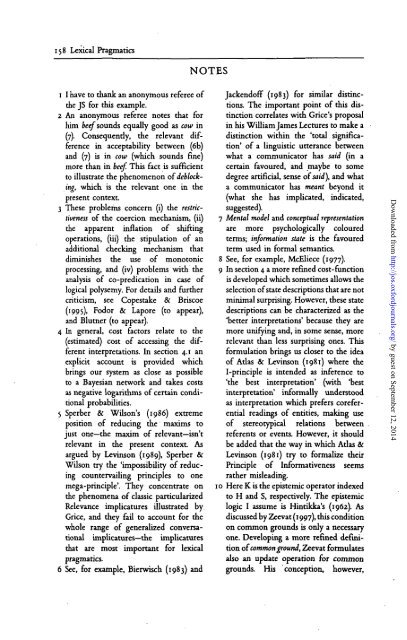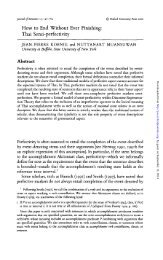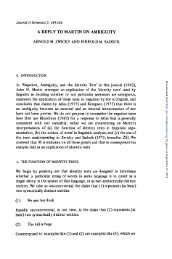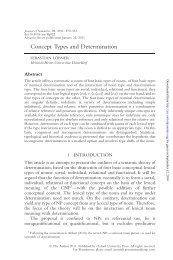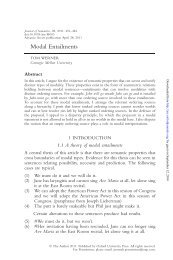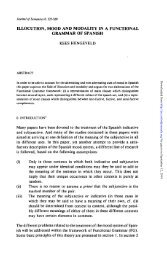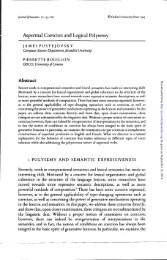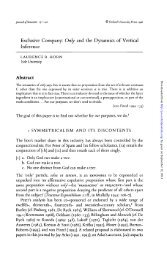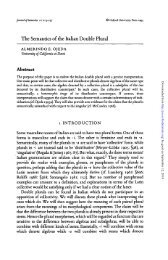Lexical Pragmatics - Journal of Semantics
Lexical Pragmatics - Journal of Semantics
Lexical Pragmatics - Journal of Semantics
You also want an ePaper? Increase the reach of your titles
YUMPU automatically turns print PDFs into web optimized ePapers that Google loves.
158 <strong>Lexical</strong> <strong>Pragmatics</strong>NOTES1 I have to thank an anonymous referee <strong>of</strong>the JS for this example.2 An anonymous referee notes that forhim beef sounds equally good as cow in(7). Consequently, the relevant differencein acceptability between (6b)and (7) is in cow (which sounds fine)more than in beef. This fact is sufficientto illustrate the phenomenon <strong>of</strong> deblocking,which is the relevant one in thepresent context3 These problems concern (i) the restrictiveness<strong>of</strong> the coercion mechanism, (ii)the apparent inflation <strong>of</strong> shiftingoperations, (iii) the stipulation <strong>of</strong> anadditional checking mechanism thatdiminishes the use <strong>of</strong> monotonicprocessing, and (iv) problems with theanalysis <strong>of</strong> co-predication in case <strong>of</strong>logical polysemy. For details and furthercriticism, see Copestake & Briscoe('99S)> Fodor & Lapore (to appear),and Blutner (to appear).4 In general, cost factors relate to the(estimated) cost <strong>of</strong> accessing the differentinterpretations. In section 4.1 anexplicit account is provided whichbrings our system as close as possibleto a Bayesian network and takes costsas negative logarithms <strong>of</strong> certain conditionalprobabilities.5 Sperber & Wilson's (1986) extremeposition <strong>of</strong> reducing the maxims tojust one—the maxim <strong>of</strong> relevant—isn'trelevant in the present context. Asargued by Levinson (1989), Sperber &Wilson try the 'impossibility <strong>of</strong> reducingcountervailing principles to onemega-principle'. They concentrate onthe phenomena <strong>of</strong> classic particularizedRelevance implicatures illustrated byGrice, and they fail to account for thewhole range <strong>of</strong> generalized conversationalimplicatures—the implicaturesthat are most important for lexicalpragmatics.6 See, for example, Bierwisch (1983) andJackend<strong>of</strong>T (1983) for similar distinctions.The important point <strong>of</strong> this distinctioncorrelates with Grice's proposalin his William James Lectures to make adistinction within the 'total signification'<strong>of</strong> a linguistic utterance betweenwhat a communicator has said (in acertain favoured, and maybe to somedegree artificial, sense <strong>of</strong> said), and whata communicator has meant beyond it(what she has implicated, indicated,suggested).7 Mental model and conceptual representationare more psychologically colouredterms; information state is the favouredterm used in formal semantics.8 See, for example, McEliece (1977).9 In section 4 a more refined cost-functionis developed which sometimes allows theselection <strong>of</strong> state descriptions that are notminimal surprising. However, these statedescriptions can be characterized as the'better interpretations' because they aremore unifying and, in some sense, morerelevant than less surprising ones. Thisformulation brings us closer to the idea<strong>of</strong> Atlas & Levinson (1981) where theI-principle is intended as inference to'the best interpretation' (with 'bestinterpretation' informally understoodas interpretation which prefers coreferentialreadings <strong>of</strong> entities, making use<strong>of</strong> stereotypical relations betweenreferents or events. However, it shouldbe added that the way in which Atlas &Levinson (1981) try to formalize theirPrinciple <strong>of</strong> Informativeness seemsrather misleading.10 Here K is the epistemic operator indexedto H and S, respectively. The epistemiclogic I assume is Hintikka's (1962). Asdiscussed by Zeevat (1997), this conditionon common grounds is only a necessaryone. Developing a more refined definition<strong>of</strong> common ground, Zeevat formulatesalso an update operation for commongrounds. His conception, however,Downloaded from http://jos.oxfordjournals.org/ by guest on September 12, 2014


